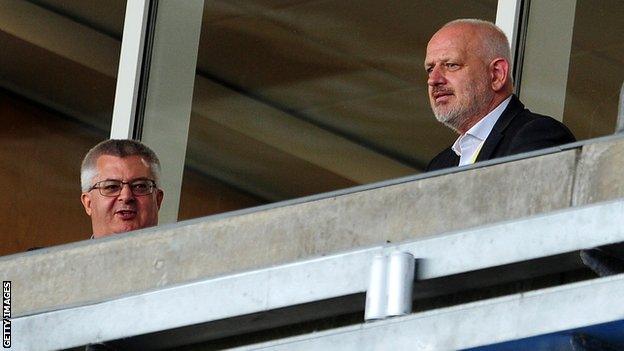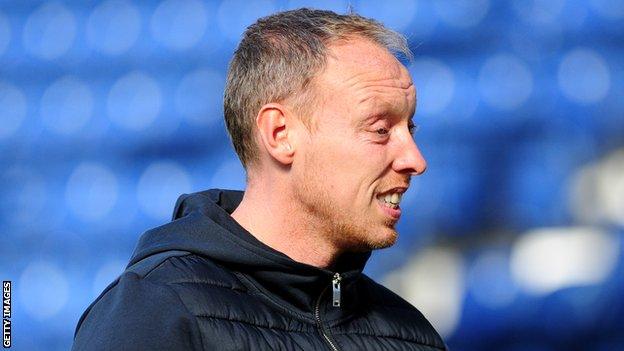Julian Winter: Swansea City CEO says US owners are doing all they can to succeed
- Published

Julian Winter (right) watched Swansea's first home game of the season, against Birmingham, from a corporate box
New chief executive Julian Winter believes Swansea City's American owners are "doing everything they can" to make the club successful.
Winter, 55, has known majority shareholders Jason Levien and Steve Kaplan for a number of years.
Having been handed day-to-day control of Swansea following Trevor Birch's move to Tottenham, Winter is convinced the Americans are in for the long term.
"They have never given me any indication that they are not," he said.
"They own the football club - I don't think there's any intention not to. It's very clear - get in and get on with the job."
A former professional player at Huddersfield Town and Sheffield United, Winter retired young through injury and, after doing a degree, returned to the game as a community officer at Grimsby Town.
He then worked for Sheffield Wednesday and Watford, where he was promoted to chief executive. He later filled the same role at Sheffield United, Notts County and Huddersfield, who he left after three-and-a-half years last season.
He met Levien and Kaplan - as well as Swansea's director of business and legal affairs Sam Porter - after leaving the Blades in 2013.
"I was introduced to them by a mutual colleague - I knew of them at that point," Winter said.
"We have had an interim dialogue since. When Swansea and Huddersfield were in the Premier League together, we saw each other at shareholders' meetings and touched base again.
"Sam I have spoken to on and off about industry-related things.
"But they (Swansea's owners) rang me to see what my situation was. They made it clear they were interviewing others - that's fine - and it went from there."

Steve Kaplan (left) and Jason Levien (right) bought a controlling stake in Swansea in 2016
Winter is the Americans' new man on the ground at the Liberty Stadium - he started work yesterday - after Birch left to be Tottenham's director of football operations earlier this month.
He says they were "looking at investing" in a United Kingdom club when he first met them, and they duly bought a controlling stake in Swansea in 2016.
Their spell at the helm has not been easy, with fans unhappy with the way the takeover was handled as well as Swansea's fortunes on the pitch and a perceived lack of investment over the last four years.
Having spoken to Levien and Kaplan - as well as other shareholders and board members - Winter says they want to progress.
"Their approach is clear to everyone," he said. "They want the club to be successful.
"They are not doing anything to make it unsuccessful. They are doing everything they can to make it successful, but they want the club to be sustainable.
"We look across lots of different divisions where clubs get into difficulty by overcooking their expectations and therefore the resources required to take a club forward.
"I think they will continue to be supportive of this club. They will be very supportive of me hopefully doing this job.
"But we will be clear about the framework within which we are going to operate.
"Then it comes down to resource allocation. It comes down to the people within the organisation building a feeling and a dynamic that takes the club forward another step."
Winter says he will be in charge of Swansea on a day-to-day basis, as was the case with Birch.
But unlike Birch, who stated publicly that he rarely spoke to Kaplan and Levien, Winter is planning frequent contact with Swansea's ownership group.

Julian Winter says he will be in regular contact with Swansea head coach Steve Cooper as he will oversee all aspects of the club, including transfers
"Regular dialogue with directors and shareholders is key for me to ensure we stay on the plan," he said.
Winter dismissed suggestions that he may be less involved in the football side of the club than Birch was, adding: "If you are a CEO of a football club and not having an oversight of that area, that's a nonsense - you are not a CEO.
"As CEO you have to be in charge of it all because there's one thing for sure, if there's a problem and the shareholders want an answer and I can't give it, that's going to look extraordinary. I will be in charge of the club."
While he is keen to see fans back in football grounds "in hopefully the near future", Winter says "there's no panic or risk" at Swansea as the club have budgeted for a lengthy spell without crowds.
As for the academy, Winter argues the recent decision to downgrade from category one status to two will not stop Swansea producing players.
"My personal belief is that if you are good at developing players, which it looks like the guys are, whether you are cat one or cat two, there isn't a huge difference," he said.
"The geography doesn't change, the facilities are still the same, most of the staff are still the same."
Swansea's owners asked to speak to some of the managers Winter has worked with as part of their interview process, and he put them in touch with David Wagner, former Cardiff boss Malky Mackay and Brendan Rodgers.
Leicester boss Rodgers masterminded Swansea's climb to the Premier League in 2011, while Wagner led Huddersfield to the top flight in 2017 while working alongside Winter.
He says a return to the elite must be the target for Steve Cooper's team.
"I have just come from a football club that had one of the lowest budgets in the Championship and got promoted to the Premier League," Winter said.
"Okay a lot of things were aligned, a lot of things came together in a moment. But it's not undoable."